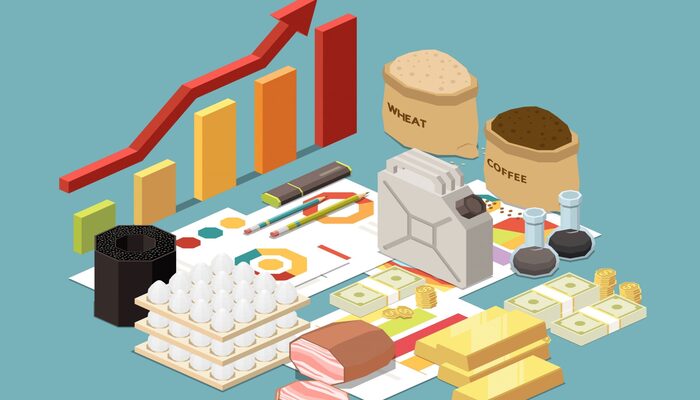Commodities play a key role in our global economy, influencing sectors ranging from agriculture to energy to precious metals. Understanding the dynamics of these markets is crucial for investors seeking to navigate the complexities of commodities investment and trading, as well as the various types of entrepreneurship that can emerge from these industries.
Investing in commodities can be an attractive strategy to diversify your investment portfolio and hedge against market volatility. However, it is essential to grasp the fundamentals and risks associated with this type of investment to make informed decisions that align with your financial goals.
What are commodities?
Commodities are physical products that can be bought and sold. They are often divided into two main categories: durable commodities and non-durable commodities. Durable commodities include products such as precious metals (gold, silver), crude oil, natural gas, and agricultural products (wheat, corn, soybeans). Non-durable commodities, on the other hand, include products such as perishable foods (meat, milk) and electrical energy.
An important feature of commodities is that they have prices determined by the global market. This means that their prices are influenced by a number of factors, including supply and demand, weather conditions, geopolitics, and global economic events.
Why invest in commodities?
Investing in commodities offers several advantages. Here are some reasons why investors consider including commodities in their portfolios:
Diversification
Diversification plays a key role in managing risk in investments, and commodities offer a unique approach to achieving this goal. What makes commodities particularly attractive is their low correlation to stock and bond markets. While stocks and bonds often move in tandem, commodities can perform independently and even appreciate in value when traditional markets are down.
This diversification of behavior helps reduce the overall volatility of the investment portfolio, making it more resilient in the face of adverse market conditions. By incorporating commodities into your investment strategy, you can potentially enhance returns while mitigating risks associated with market fluctuations.
Inflation protection
Commodities, particularly precious metals such as gold and silver, have historically served as reliable havens during periods of high inflation. These assets are characterized by limited supply and are widely sought after as protection against currency devaluation. During episodes of inflation, when the purchasing power of traditional currencies decreases, the demand for precious metals increases, resulting in higher prices.
Gold, in particular, is often regarded as a safe asset that preserves value over time, making it a popular choice for investors concerned about inflation. As economic uncertainty looms, many turn to precious metals to safeguard their wealth and maintain purchasing power, reinforcing their status as a strategic investment in inflationary environments.
Potential for profits
Commodities present considerable profit opportunities for attentive investors. When a commodity is purchased and its price rises, substantial gains can be realized by selling it at a higher amount. However, it’s essential to recognize that commodity prices are notoriously volatile and can fluctuate sharply due to various factors, such as weather conditions, geopolitical events, and changes in global supply and demand.
This volatility introduces significant risk to investing in commodities, requiring a careful and strategic approach. Investors must stay informed about market trends and external influences that could impact prices, enabling them to navigate challenges and maximize potential returns in this dynamic landscape.
How to invest in commodities?
There are several ways commodities investment, and the choice of approach depends on individual preferences and financial goals. Here are some common options:
Futures Contracts
Futures contracts offer an intriguing way to get involved in the commodity market without the need to physically own the underlying assets. They allow investors to speculate on commodity price movements, either to profit from rising or falling prices. However, this approach involves significant risks and complexities. Futures contracts require a deep understanding of market dynamics as investors are committed to a specific price and date in the future. In addition, there are collateral margins, which can result in losses that exceed the initially invested capital.
Commodity ETFs
Commodity Exchange-Traded Funds (ETFs) offer an effective and affordable approach for investors who want to gain exposure to the commodity market without. The challenges associated with directly purchasing physical assets or trading futures contracts. These funds are designed to track the performance of a diversified basket of commodities while providing broad and balanced market exposure. The particularly attractive aspect of commodity ETFs is that they trade like stocks on stock exchanges. Making them easy to buy and sell, with daily liquidity.
Direct Purchase
Buying commodities directly, whether in physical form, such as gold bars or bags of grain, or virtual, through direct contracts, is an approach that attracts investors seeking physical possession of the underlying assets. This strategy offers a level of control and tangible ownership that other investment methods do not provide. For example, buying precious metals like gold or silver in physical form is seen as a reliable store of value over time. However, it is important to note that this approach also brings challenges. Such as storage and security costs, as well as the need to become an active participant in the commodity market.
Risks of investing in commodities
While investing in commodities offers opportunities for diversification and inflation protection, it also comes with its own risks. Here are some of the main risks associated with investing in commodities:
- Price volatility: Commodity prices can be highly volatile, subject to significant fluctuations in short periods of time. This can result in substantial losses for investors.
- Supply risks: Unpredictable events such as natural disasters, geopolitical conflicts, and supply problems can dramatically affect commodity supply and influence prices.
- Need for storage: If you choose to invest in physical commodities such as oil or precious metals. You will need to consider the costs and challenges associated with securely storing these assets.
Considerations for investing in commodities
Investing in commodities can be a valuable strategy to diversify your investment portfolio and hedge against inflation. However, it is important to be aware of the risks involved and to carefully choose the investment approach that best suits your financial goals. If you are considering investing in commodities, seeking guidance from a financial professional or investment advisor is advisable to ensure your decisions align with your financial situation and long-term objectives.
Always remember that investing involves risk, and being well-informed is crucial before making any financial decisions. Understanding the market dynamics and potential volatility of commodity investments will help you make more strategic choices that contribute to your overall financial success.





